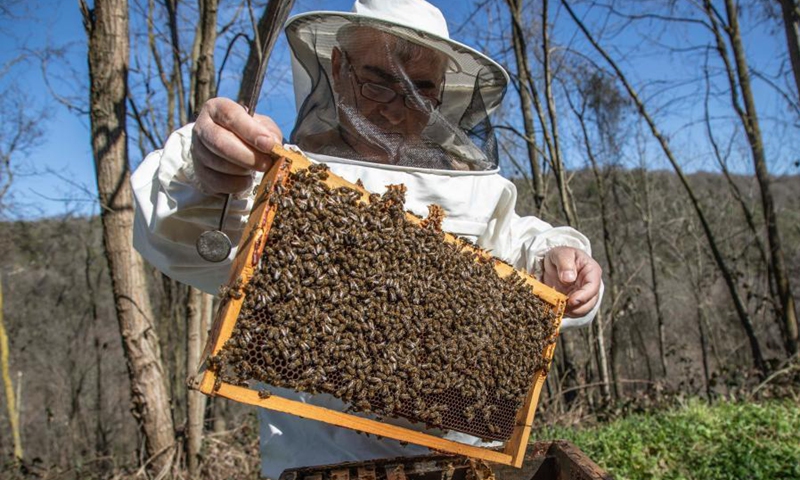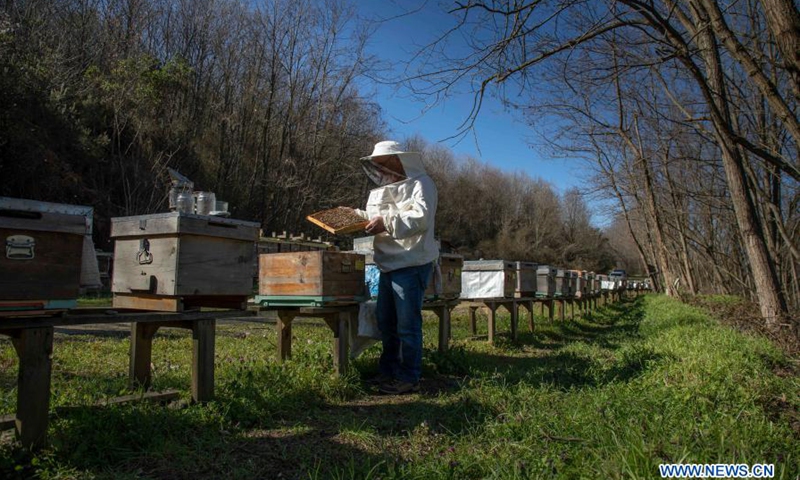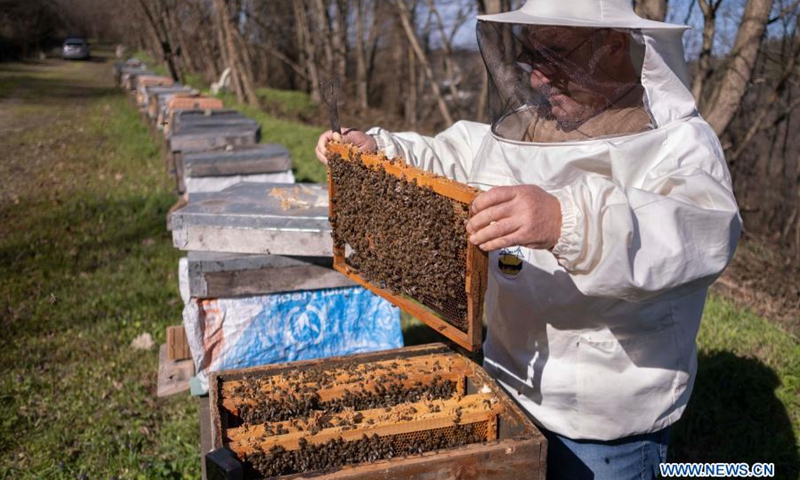
Ahmet Can, a beekeeper and head of Sile Beekeepers Agricultural Development Cooperative, checks a beehive at an apiary in Sile, a remote district of Istanbul, Turkey, on March 5, 2021. The number of hives across the country increased to 8 million in 2019, up from 5.6 million in 2010, with honey production from 81,000 tons to 109,000 tons, according to recent press reports.(Photo: Xinhua)

Ahmet Can, a beekeeper and head of Sile Beekeepers Agricultural Development Cooperative, checks a beehive at an apiary in Sile, a remote district of Istanbul, Turkey, on March 5, 2021. The number of hives across the country increased to 8 million in 2019, up from 5.6 million in 2010, with honey production from 81,000 tons to 109,000 tons, according to recent press reports. (Photo: Xinhua)

Ahmet Can, a beekeeper and head of Sile Beekeepers Agricultural Development Cooperative, checks a beehive at an apiary in Sile, a remote district of Istanbul, Turkey, on March 5, 2021. The number of hives across the country increased to 8 million in 2019, up from 5.6 million in 2010, with honey production from 81,000 tons to 109,000 tons, according to recent press reports. (Photo: Xinhua)

Ahmet Can, a beekeeper and head of Sile Beekeepers Agricultural Development Cooperative, checks a beehive at an apiary in Sile, a remote district of Istanbul, Turkey, on March 5, 2021. The number of hives across the country increased to 8 million in 2019, up from 5.6 million in 2010, with honey production from 81,000 tons to 109,000 tons, according to recent press reports. (Photo: Xinhua)
Wearing a fencing-style beekeeping jacket, Ahmet Can, a retired Turkish citizen, sprayed smoke into one of his hives to calm down the honey bees before proceeding with his routine inspection.
The beekeeper then could manage to put his hands inside the hive. He successfully removed the first frame without any bee attack and saw the queen bee among thousands of worker bees.
After retiring from a bank 10 years ago, Can started beekeeping with only two hives in Sile, a remote district of the country's biggest city Istanbul. Soon after, the number of hives increased to 10 and later to 50.
Sile, about 70 km from the metropolis, offers rich opportunities for honey production and apiculture in its large forest area packed with chestnut trees along the Black Sea shores.
"Here we produce chestnut honey," Can told Xinhua, noting that it is one of the best dark honey in the world with unique properties good for health, especially for stomach-related problems.
To keep up with production, expand apiculture activities, and market products without intermediaries, most local beekeepers have been operating under the roof of Sile Beekeepers Agricultural Development Cooperative, chaired by Can.
Hosting up to 11,000 hives, 300 households live on beekeeping in the region, according to Can.
"Production of chestnut honey in the region varies between 5 to 7 kg per hive, making over 50 tons of chestnut honey annually," he added.
"After harvesting our products here, we go to other areas to get different honey types, including highland honey in the central Anatolia region, lavender in Aegean, and sunflower in the Thrace region," Can said.
In his view, one of the biggest challenges is global warming and the destruction of forestland.
The extensive urban transformation in populous Istanbul and the increasing number of quarries near Sile, has affected the ecological environment, Can said.
He also mentioned diseases called "branch cancer" and "root diseases" which cause the trees to wither. Besides, the forest trees and plants have also been suffering from a parasite in the last five years, which prevents flowering.
The beekeeper said, despite all the setbacks, the ultimate target of the region's professional beekeepers is to open up to the world by boosting the potential, enhancing branding activities with a high-quality standard, and institutionalizing through cooperatives.
He said companies do not pay much attention to individually produced beekeeping products, while producers can easily find buyers only when they have a corporate identity with a branded product, calling on all farmers to unite under related cooperatives.
"We are currently using a maximum of 20 percent of the capacity of the area here. The potential can go up only if all producers join the cooperative," he stressed.
Speaking of the state incentives, he noted that relevant institutions provide like 15 Turkish liras (approximately 2 U.S. dollars) per hive.
"This may seem very low now, but the government is aware of the importance of this business," he said, noting that the state institutions, as well as local municipalities, also provide hives free of charge.
"Additionally, they give machinery equipment with 50 percent grant support, which is highly appreciated," he added.
The number of hives across the country increased to 8 million in 2019, up from 5.6 million in 2010, with honey production from 81,000 tons to 109,000 tons, according to recent press reports.
